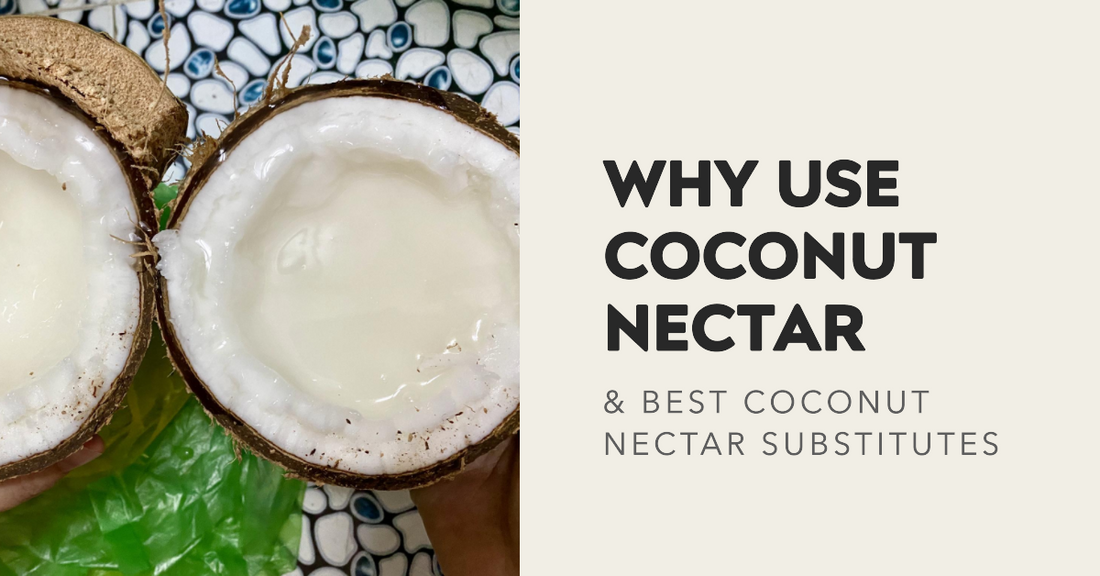
Why Use Coconut Nectar (& Best Coconut Nectar Substitutes)
Share
There are many benefits to using coconut nectar. It is a natural sweetener with a lovely, subtle sweet taste. Since coconut nectar has a much lower glycemic index than cane sugar and other sweeteners, it is also a very healthy option.
What is Coconut Nectar and Is It Healthy?
Coconut nectar, also known as coconut syrup or coconut flower nectar, is a natural sweetener derived from the sap of coconut tree blossoms. It is a traditional sweetener in various Southeast Asian countries and has gained popularity as an alternative sweetener in the health food industry.
Coconut nectar is an organic, healthy substitute for artificial sweeteners and refined sugar. Having a significantly lower glycemic index than regular sugar, it is a much healthier option.
What is Coconut Nectar Made Of?
The primary ingredient in coconut nectar is the sap collected from the flower buds of coconut palm trees.
This sap is also known as coconut flower sap or coconut blossom sap. Farmers typically make small incisions in the flower buds, allowing the sap to flow out.
Nutritional Benefits of Coconut Nectar
-
All-Natural: Coconut nectar is an all-natural, non-GMO sweetener without added sugar.
-
Antioxidants: Studies show that coconut nectar is rich in 17 different antioxidants.
-
Electrolytes: Coconut products such as coconut water, coconut syrup, and coconut nectar are all excellent sources of electrolytes, according to the US Department of Agriculture (USDA).
-
Low Glycemic Index: Coconut nectar will not raise your blood sugar levels, which is essential to diabetic people as well as dieters.
-
Nutrients: Rich in minerals, including magnesium, potassium, zinc, and iron, as well as vitamin B and vitamin C. Coconut nectar also contains essential amino acids.
Is coconut nectar safe?
Coconut nectar is considered safe for most people when consumed in moderation as part of a balanced diet.
How much sugar is in coconut nectar?
On average, coconut nectar typically contains about 70-80% total sugars by weight.
The specific types of sugars found in coconut nectar include:
-
Sucrose: Coconut nectar contains sucrose, which is a disaccharide made up of one molecule of glucose and one molecule of fructose. Sucrose is one of the primary sugars in coconut nectar.
-
Fructose: Fructose is a natural sugar found in coconut nectar. It is a monosaccharide and contributes to the overall sweetness of the nectar.
-
Glucose: Glucose is another monosaccharide found in coconut nectar. It is less sweet than fructose but still contributes to the overall sugar content.
Despite its sugar content, coconut nectar is often considered a healthier alternative to refined sugars due to its lower glycemic index (GI), which means it has a milder impact on blood sugar levels compared to table sugar.
Can Diabetics Eat Coconut Nectar?
With a naturally low glycemic index, coconut nectar is an excellent sweetener for people with diabetes.
Is Coconut Nectar the Same as Coconut Sugar?
Coconut nectar and coconut sugar are related but not the same.
coconut nectar is a liquid sweetener with a caramel-like flavor, while coconut sugar is a granulated sweetener with a taste resembling brown sugar. Both are natural alternatives to refined sugars and are derived from coconut palm tree sap.
6 Delicious Coconut Nectar Substitutes
There are options if you are looking for sweetener substitutes for coconut nectar.
-
Agave Nectar: An amber-colored liquid harvested from the agave plant, its nectar is used as a sweetener.
-
Allulose occurs in nature but is also manufactured as a sugar-free artificial sweetener.
-
Date Syrup: This is a thick, dark syrup made by cooking down dates.
-
Raw Honey: Honey is a popular, natural sweetener sold at local health food stores and available from local beekeepers.
-
Maple Syrup: Sap can be harvested from maple trees and then cooked down into syrup.
-
Molasses: Molasses is the thick, dark liquid that results when sugar is processed.
Is Coconut Nectar Healthier Than Maple Syrup?
Although it is a tasty treat, maple syrup is very high in calories and carbohydrates, resulting in a high glycemic index. It also has very little nutritional value. This makes coconut nectar a better choice.
Is Coconut Nectar Healthier than Honey?
While both are natural sweeteners that can be enjoyed free of preservatives, honey has a very high glycemic index. Again, coconut nectar is a healthier option.
Some Coconut Nectar Products to Try
-
Coconut Secret low sodium soy sauce alternative
-
Cocofina unrefined coconut sugar
-
Copra certified organic natural sugar-free liquid sweetener
-
Wild Country organic coconut nectar
